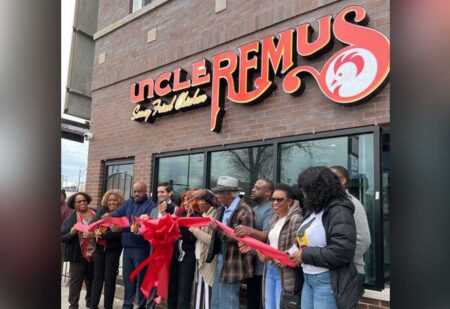Dressed in her Sunday best — pink ruffled sleeves and a rainbow tulle tutu — Crystal Martinez’s 4-year-old daughter proudly presents her with a multicolored bouquet of carefully crafted tissue paper flowers. With her 5-year-old son nestled on her lap, laughing in delight, Martinez holds out her arms and pulls the girl into a hug so tight that her glasses are knocked askew.
“I want you! I don’t want the flowers,” Martinez says , smiling and holding her children close.
Martinez’ five children, including the three aged 13, 10 and 6, last month traveled for three hours from Chicago to visit her in Logan Correctional, Illinois’ largest state prison for women and transgender people, on the Reunification Ride. The donation-dependent initiative buses prisoners’ family members 180 miles (290 km) from the city to Logan every month so they can spend time with their mothers and grandmothers.
The number of incarcerated women in the United States dropped by tens of thousands because of COVID-19. But as the criminal justice system returns to business as usual and prison populations creep back to pre-pandemic norms, more children are being separated from their mothers, putting them at greater risk of health and behavioral problems and making them vulnerable to abuse and displacement.
Black and Hispanic women are more likely to be imprisoned than white women and are affected disproportionately by family separation due to incarceration.
Women held at Logan describe the Reunification Ride — one of the increasingly rare, under-funded programs designed to keep families together — as a crucial lifeline.
“I thank God that it is at least once a month. Some people don’t get to see their kids at all,” says Joshlyn Allen, whose 5- and 3-year-old children were visiting her with their grandmother.
[ Don’t miss: When prison is home for the holidays ]
The kids and their caregivers meet at 7 a.m. at a South Side big box store parking lot, bleary-eyed but excited. Organizers hand out snacks, games, water and coloring supplies as they get on the road.
Three hours later, the charter bus pulls up at the facility’s barbed wire gates in Lincoln, Illinois, with children peering from the windows. As families progress slowly through security, shouts of “Mommy!” and squeals of glee fill the prison gym made cheerful with handmade decorations.
The prisoners create decorations for the visits, including colorful paper flowers, butterflies, family photos framed in construction paper and even the bouquet presented to Martinez by her daughter. Families are not allowed to bring anything besides essentials, such as diapers.
The number of women incarcerated in the U.S. dropped by about 30%, to 146,000, from 2019 to 2020, according to U.S. Department of Justice data. The nonprofit Prison Policy Initiative attributes that decrease to slowdowns in court proceedings, temporary process changes and efforts to reduce prison populations due to the pandemic.
But female prison and jail populations are rebounding to pre-pandemic levels.
“We are seeing more and more families separated,” said Alexis Mansfield, Reunification Ride coordinator for the Women’s Justice Institute.
About 58% of women in state or federal prisons are parents of minor children in the U.S. Black and Latina women experience greater incarceration rates than white women and are about as likely or more likely to be parents, according to the Bureau of Justice Statistics.
Although women are far less likely to be imprisoned than men, their incarceration can have outsized effects on families, Mansfield said. She has witnessed children reuniting with their incarcerated mothers after months or years apart who “immediately disclose that they’re being abused or that they’re facing a challenge at school.”
“That bond between mothers and children is so strong. And without seeing their moms, very often kids are in vulnerable positions with nobody to turn to,” she said.
Gina Fedock, professor at the University of Chicago’s Crown Family School of Social Work, Policy and Practice, researches the well-being of marginalized women, particularly those behind bars.
Programs like Reunification Ride that offer recurring visits are rare in the U.S., Fedock said.
“Most states don’t have such opportunities,” she said. “There’s a real lack of consistent resources, particularly these types of transportation programs.”
University of Chicago researchers found only one similar initiative in a nationwide sweep, Hour Children in New York, Fedock said.
Incarcerated women tend to be the primary caregivers and often are the breadwinners, meaning children whose mothers are imprisoned are frequently displaced or enter the child welfare system, she said.
The impact of this kind of “ambiguous loss” of a parent can lead to increased risk of health issues, developmental delays, behavioral problems and issues with education, since kids moving in with a different caregiver often have to switch schools abruptly, according to the researcher.
“It’s really easy for (the children) to fall through the cracks,” Fedock said.
Maintaining the maternal bond can reduce “the traumatic effects of parental incarceration for those children and their families,” Fedock explained. “Every constraint on the parent constrains the parenting relationship.”
Nyia Pritchett says she was unable to visit her mother, Latonyia Dextra, without Reunification Ride. Before the trip, the 27-year-old had not seen Dextra in person for three years.
Pritchett, who lives an hour outside of Chicago, awoke at 4 a.m. to catch the bus.
“It’s worth it,” she says. “So much time my mom has missed out of our lives. The little times like this mean a lot.”
Dextra is serving a 28-year sentence and has been imprisoned since Pritchett was a child. During the visit, she braids Pritchett’s vibrant red curls into a crown.
“It felt like when I was a little girl,” Pritchett says.
Pritchett weeps as she recounts the time spent without her mother. Dextra holds her and wipes away her tears.
Dextra says her children give her hope and that “this program means a lot.”
The Reunification Ride, formerly the recipient of public funds that dried up in 2015 during Illinois’ two-year budget impasse, has been adopted by nonprofits that rely on crowdsourcing and volunteers to keep the program alive. Each trip costs about $3,000 to $3,500.
Afternoon Briefing
Daily
Chicago Tribune editors’ top story picks, delivered to your inbox each afternoon.
“We realized that this was just too important to stop,” Mansfield said.
Erika Ray is serving a 42-year sentence for armed robbery and murder. Her 23-year-old daughter, Jada Lesure, was just 7 when her mother was charged. Lesure now brings her 4-year old son to visit.
The programs offer a child-friendly, welcoming alternative to the strict rules of a typical visit behind glass or in small visitor spaces where kids struggle to sit still, without games or food, Ray says.
“There wasn’t any program like this” when Jada was a child, Ray says, watching her grandson zoom happily around the gym.
But even as an adult, Lesure says, “I need my mom. Everybody needs their mom.”
Ray laments it will be a long time before she is able to return home.
“There is no way to punish the parent and not punish the child,” she says.







